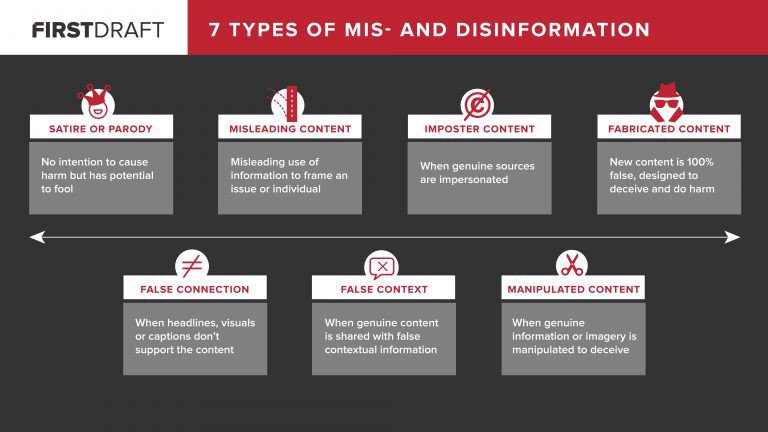Stop Calling It Fake News. – Harvard Kennedy School PolicyCast

my notes ( ? )
it just felt like the conversations that we were having subsequently were actually pretty shallow and actually pretty useless, because we were talking over each other because everybody meant different things... we can only really start talking about interventions if we understand what we’re talking about...
I say, “Please don’t use the term.” “Yeah, but it’s going to help me get funding because it’s the sexy term right now... as a shortcut, it’s lazy and it’s unhelpful and it’s being weaponized...
you’ve proposed in your report, these three different types of information... Misinformation, disinformation, and mal-information... Misinformation is false information that’s not intended to cause harm... a mistake... That’s misleading...; Disinformation ... the person who is creating or sharing it knows that it’s false and is sharing it with the intent to cause harm....; mal-information... it’s genuine information... revealed to cause harm....
the people who are involved with this. It’s not just about one individual, one organization... four different types: financial, political, social and psychological... If we’re trying to stop those people who are motivated by financial motivations, there are a certain set of changes that we could do. Political disinformation is another set of motivations. If it’s social, it’s another set of motivations again... for each of these aspects, agents, messages and interpreters, we need to ask questions. For every particular piece of content, who is the agent, what do we know about them?...
we’re seeing this as ... one big problem that we can solve with a tweak of an algorithm... we’re not going to ... if we don’t understand all the different types...
we’ve always had propaganda, but ... broadcast ... from somebody else. Now... that weaponized atom of information comes from your best friend... social media has become a performative act... a platform where we have to perform for our friends and family...
Russia could create a whole host of amazing memes. If none of us share them, we haven’t got a problem... we really should be thinking of is communication as ritual... many people have simply said, “We just need more fact checking... even those of us who are more educated and more literate and more enumerate are actually more likely to do mathematical somersaults to make sense of data that it reinforces our world view.... we have to stop thinking like rational academics and to understand the power of emotion...
before we start thinking we need to feel something and it’s only after that that we know what to think... metaphors determine, to a large degree, the way we relate to the world... the ritual aspect, which comes from the real meaning of commune and community ... about relating to a world view rather than, obviously, transmission of the message... “When you read a newspaper... you’re participating in a ritual"...
the post enlightenment era ... reason and facts and text are replaced with feelings and emotions and images. It’s really hard to expect people to be rational thinkers when they don’t have time to basically read anything more than one or two paragraphs... the difference here is images. It’s not articles, full articles of false information, but an image with maybe a few words over top...Our brains are a lot less likely to be critical of visuals. We are trained to trust visuals... we don’t need to use the same brain power... the platforms ... haven’t ... focused enough on how do you monitor ... memes... the most powerful vehicles of disinformation...
information to which votes were exposed during the election campaign was overwhelmingly produced not by fake news sites... but by household names like the New York Times ... the effect of disinformation, I think, is a bit exaggerated when it comes to elections... manufactured amplifications are easy... to spot and detect by the social media platforms...
We cannot ... like or dislike a piece of news. We can only say we agree or disagree with an opinion... Liking a news story is like agreeing with a piece of music... change those buttons from likes to ... agree, disagree, suspect, trust... change people’s relations to ... information... this emotionality is really detrimental...
How do we both build up that ability to look skeptically upon the sources of information ... while at the same time build back that trust in mainstream media institutions?... news organizations have been terrible at actually explaining their processes and procedures and policies ... Unfortunately, newsrooms have been gutted... we’re now expecting journalists to do more... Instead of giving people fishes we have to teach them fishing... media literacy... in Northern Europe, these campaigns are much less effective compared to North America... the public education system is not good enough when it comes to giving ordinary people these critical thinking skills
Read the Full Post
The above notes were curated from the full post hkspolicycast.org/stop-calling-it-fake-news-6c86f9647e63.Related reading
More Stuff I Like
More Stuff tagged news , media , psychology , top3pods , factchecking , identity , metaphor , education , meme , disinformation , social media , media literacy
See also: Content Strategy , Social Media Strategy , Content Creation & Marketing , Psychology , Social Web , Media , Politics